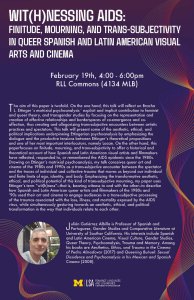Presented By: Romance Languages & Literatures RLL
Wit(h)nessing Aids
Finitude, Mourning, and Trans-Subjectivity in Queer Spanish and Latin American Visual Arts and Cinema

Speaker: Julián Gutiérrez Albilla, Professor of Spanish and Portuguese, Gender Studies and Comparative Literature at University of Souther California. His interests include Spanish and Latin American Cinema, Visual Culture, Gender Studies, Queer Theory, Psychoanalysis, Trauma and Memory. Among his books are Aesthetics, Ethics, and Trauma in the Cinema of Pedro Almodovar (2017) and Queering Buñuel: Sexual Dissidence and Psychoanalysis in his Mexican and Spanish Cinema (2008).
The aim of this paper is twofold. On the one hand, this talk will reflect on Bracha L. Ettinger´s matrixial psychoanalysis´ explicit and implicit contribution to feminist and queer theory, and transgender studies by focusing on the representation and creation of affective relationships and border spaces of co-emergence and co-affection, thus creating and allegorizing trans-subjective encounters between artistic practices and spectators. This talk will present some of the aesthetic, ethical, and political implications underpinning Ettingerian psychoanalysis by emphasizing the dialogue and the productive tensions between Ettinger’s theoretical propositions and one of her most important interlocutors, namely Lacan. On the other hand, this paper focuses on finitude, mourning, and trans-subjectivity to offer a historical and theoretical account of how Spanish and Latin American visual artists and filmmakers have reflected, responded to, or remembered the AIDS epidemic since the 1980s. Drawing on Ettinger’s matrixial psychoanalysis, my talk conceives queer art and cinema of the 1980s and 1990s as a trans-subjective encounter between the spectator and the traces of individual and collective trauma that moves us beyond our individual and finite limits of ego, identity, and body. Emphasizing the transformative aesthetic, ethical, and political potential of this kind of trans-subjective mourning, my paper uses Ettinger’s term “wit(h)ness”—that is, bearing witness to and with the other—to describe how Spanish and Latin American queer artists and filmmakers of the 1980s and ‘90s used their art and cinema to engage audiences in a trans-subjective processing of the traumas associated with the loss, illness, and mortality exposed by the AIDS virus, while simultaneously gesturing towards an aesthetic, ethical, and political transformation in the way that individuals relate to each other.
The aim of this paper is twofold. On the one hand, this talk will reflect on Bracha L. Ettinger´s matrixial psychoanalysis´ explicit and implicit contribution to feminist and queer theory, and transgender studies by focusing on the representation and creation of affective relationships and border spaces of co-emergence and co-affection, thus creating and allegorizing trans-subjective encounters between artistic practices and spectators. This talk will present some of the aesthetic, ethical, and political implications underpinning Ettingerian psychoanalysis by emphasizing the dialogue and the productive tensions between Ettinger’s theoretical propositions and one of her most important interlocutors, namely Lacan. On the other hand, this paper focuses on finitude, mourning, and trans-subjectivity to offer a historical and theoretical account of how Spanish and Latin American visual artists and filmmakers have reflected, responded to, or remembered the AIDS epidemic since the 1980s. Drawing on Ettinger’s matrixial psychoanalysis, my talk conceives queer art and cinema of the 1980s and 1990s as a trans-subjective encounter between the spectator and the traces of individual and collective trauma that moves us beyond our individual and finite limits of ego, identity, and body. Emphasizing the transformative aesthetic, ethical, and political potential of this kind of trans-subjective mourning, my paper uses Ettinger’s term “wit(h)ness”—that is, bearing witness to and with the other—to describe how Spanish and Latin American queer artists and filmmakers of the 1980s and ‘90s used their art and cinema to engage audiences in a trans-subjective processing of the traumas associated with the loss, illness, and mortality exposed by the AIDS virus, while simultaneously gesturing towards an aesthetic, ethical, and political transformation in the way that individuals relate to each other.